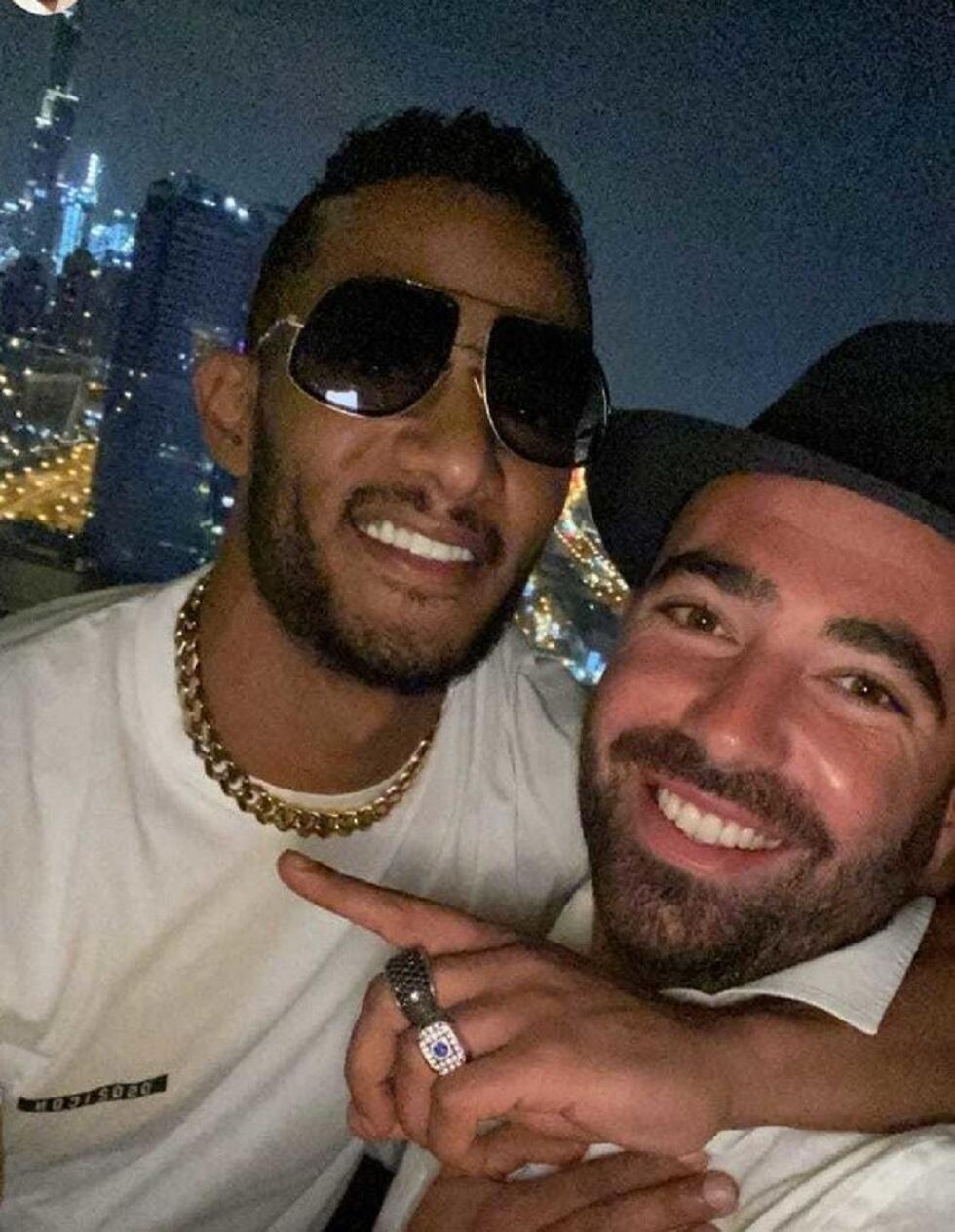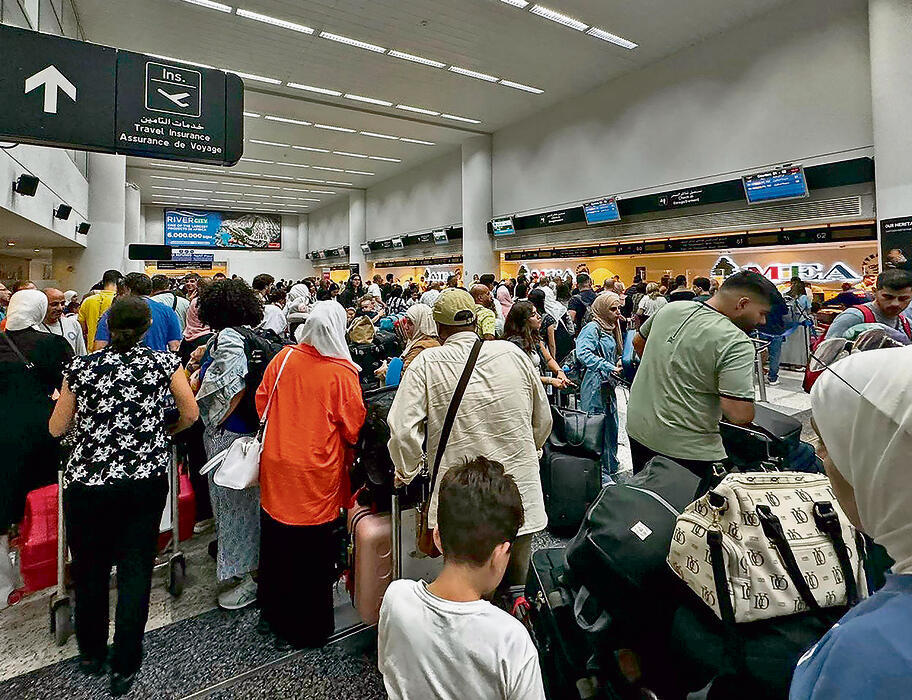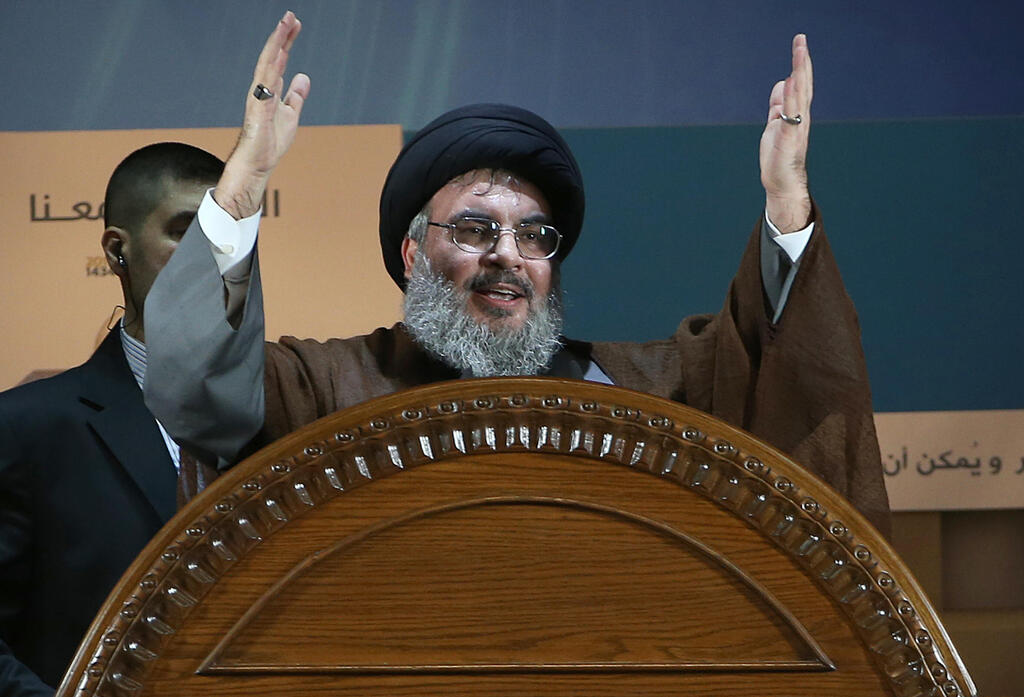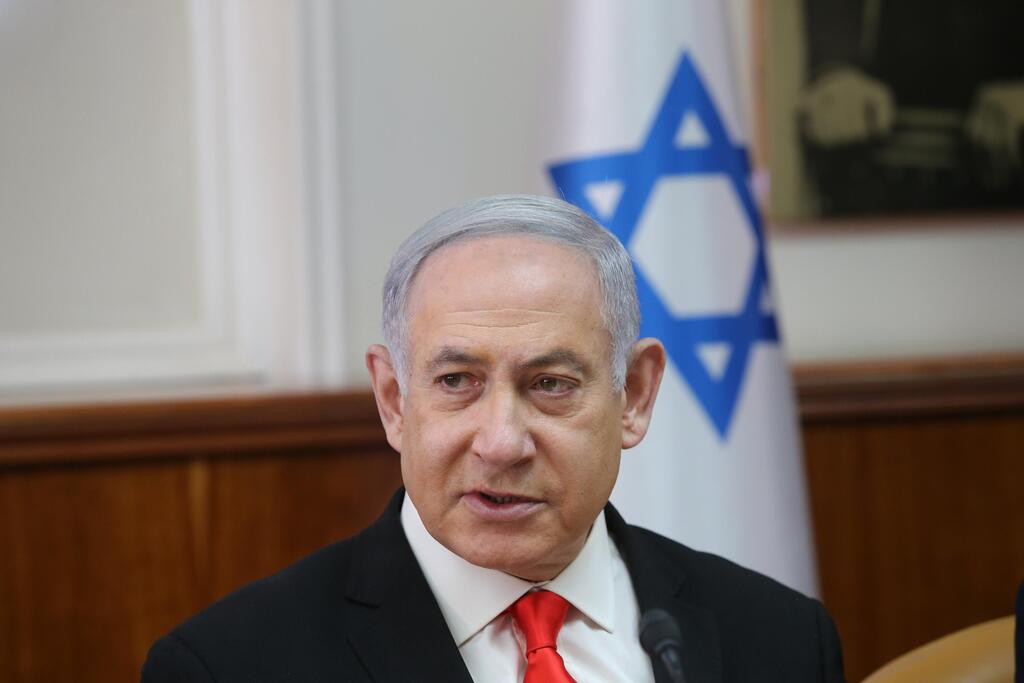Getting your Trinity Audio player ready...
In normal times, the Lebanese port city of Jounieh bustles with life during August. Tourists flock to its beautiful beaches, vibrant markets and the famed statue of Our Lady of Lebanon, which overlooks the city from a nearby village. By night, Jounieh transforms as its bars, cafes and nightclubs offer a stark contrast to the city's daytime innocence.
But these are not normal times. Jounieh, located just 20 kilometers (12 miles) north of Beirut, now feels the palpable tension of war. Those who might have missed the signs are quickly brought back to reality by the sonic booms of Israeli Air Force jets in the skies above.
6 View gallery
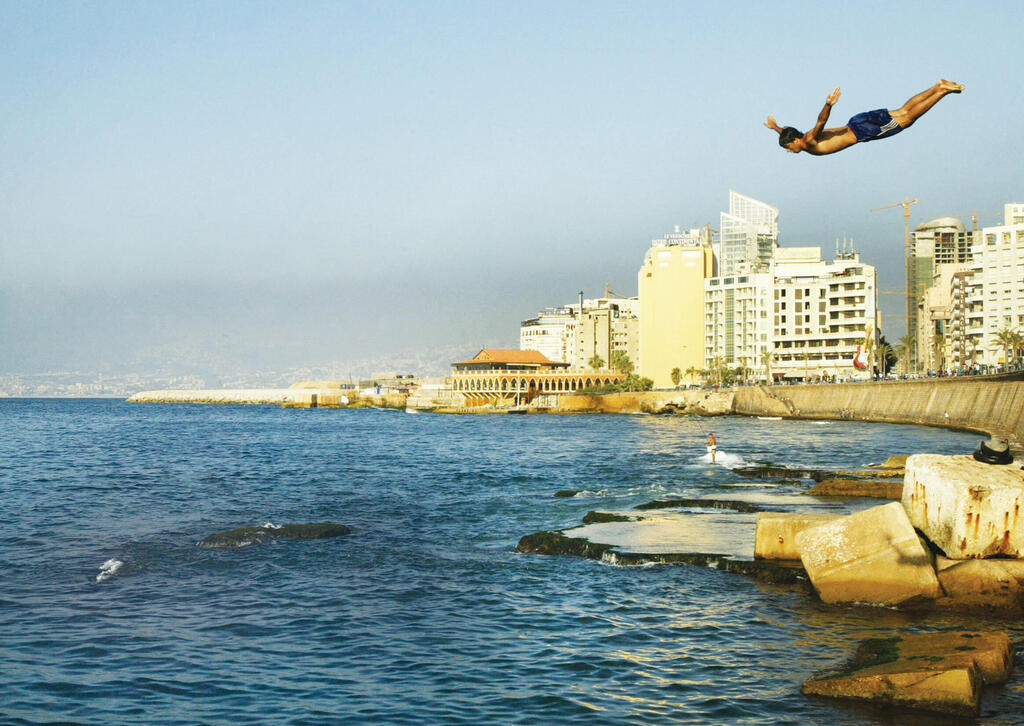

A Lebanese boy jumps into the waters of Beirut's port, summer 2006
(Photo: PATRICK BAZ/AFP)
Despite the unrest, a group of seven young Lebanese men and women gathered in Jounieh earlier this month for their biannual meeting. They have been friends for years, hailing from different walks of life—some professionals, some government employees. The group includes both Maronite Christians and Sunni Muslims. They met at a cafe overlooking Jounieh’s port, a site bombed during the Second Lebanon War, uncertain of what the future holds.
During the meeting, we managed to speak with them. Yafiyeh (a pseudonym), 29, a Sunni Muslim, describes himself as someone who loves "the good life, like all Lebanese." When asked if he could do anything to stop the hostilities with Israel, he replied, "The answer is clear: there's nothing to be done."
Are you following the news about the Hezbollah-Israel tensions?
"I'm completely indifferent," he says. "What worries me more is that I live with my family in a neighborhood close to Beirut (which could be bombed again) and that soon I need to start seriously looking for a wife because it’s about time. I even know some Israelis from my time living in France."
And how did you get along?
"I met three or four Israelis, and it was fine. We actually became friends. We had common ground, and as we grew closer, we agreed that we were neighbors. The Israelis were quick to ask me about Hezbollah. I told them I didn't know anything. I explained that you can live in certain parts of Lebanon without ever coming into contact with them. Overall, I hate Hezbollah because they’re destroying the country."
Maria, a 23-year-old student, also doesn’t believe there's a problem between Jews and Lebanese. "I grew up in Beirut hearing family stories about their Jewish neighbors. I never met them, as they left before I was born, but I know there were good relations, even after they emigrated to France. I remember stories about how they shared childcare duties, with my mother and the Jewish mothers taking their kids out together. They even bought clothes in bulk for their children and sent them together to kindergarten and elementary school."
What happened next?
"One day, unexpectedly, the Jewish neighbor came to my mother and said they were leaving. They had sold their apartment, received their papers and left on a plane. Years later, we found out they had gone to Israel. The connection was lost, but my mother always spoke warmly of them. Even later, in high school, there was a Jewish girl in my class. We called her 'Daughter of the Heavens' behind her back, and some mocked her for wearing long sleeves even in the summer. It didn’t bother me that she was Jewish. I was friendly with her, but only to a point. I never came over to her place."
Why not?
"Because officially, Israel is still considered an enemy state, and it’s forbidden to have relations with it. Yet, I learned that Israeli goods reached Lebanon through Cyprus, and after removing the labels, they were sold in markets and stores. I remember, for example, the Klik chocolate products that we knew came 'from there.' Also, the sweetener Sukrazit. Once, we reconnected with our former Jewish neighbors."
How did that happen?
"One day, my grandmother fell seriously ill. Out of the blue, my mother received a phone call from her former Jewish neighbor, who was visiting France. The neighbor offered to send a specific medication. My mother explained that she was worried it would be discovered that the medication came from Israel because it's made there. The neighbor reassured her that she would send it from France and remove all labels, which is what happened. So, I ask, how can you hate all Jews or Israelis?"
What is the dream of a young Lebanese today?
Ahmadi, one of the meeting’s participants, 27, said, "We want to finish our studies, find a job and I don’t mind leaving Lebanon and only coming back for visits. I don’t see my future here."
He’s a music lover, and the conflict also managed to find a way to creep into that. "Just this May, singers from across the Arab world performed here, including [the successful Egyptian pop singer] Amr Diab and [Iraq's] Kazem Al-Saher. Next week, Mohamed Ramadan from Egypt is expected to perform—the same one who was photographed with [Israeli singer] Omer Adam in Dubai and with Israeli fans. They’re already calling to boycott him. But I’m sure,” he declares, “that if Ramadan comes, the venue will be packed. Why should we care that he has fans in Israel or that he was photographed with Omer Adam?"
Nasreen, 27, added, "It’s important that Israelis understand we have no connection with Hezbollah. Lebanon operates like a state within a state. The truth is, we haven't been a functional country since the horrific explosion at the Beirut port in August 2020 (the ammonium nitrate explosion that killed 218 Lebanese, injured thousands and left tens of thousands homeless. In Lebanon, this explosion is seen as a symbol of government corruption and incompetence). There's a thin layer of wealthy people, led by President Najib Mikati, who’s just an interim president fed up with serving and wants to return to business. There are other wealthy officials, the Hezbollah leadership and then there’s the majority of Lebanese people, who now live off foreign donations."
And those who don’t?
"Are forced to make do with a hard life, hand to mouth."
Maria added, "Hezbollah, for me, is a strong and threatening entity that I prefer to avoid and not engage with. They’re even at the airport, checking passports to make sure no ‘disguised Israeli’ gets through. All my friends keep their distance from them. They’re on one side, and we’re on the other. I remember your defense minister, Benny Gantz, offering aid to Lebanon two years ago. No one dared to accept the offer, though it was discussed in private."
What did people say about it?
"Benny Gantz said that Lebanese citizens aren’t Israel’s enemies, and I thought to myself, how right he is, and how we have a common enemy that’s destroying lives, not just in southern Lebanon but also in Beirut and beyond, affecting daily life across the country. We all knew that Israel had treated injured Syrian civilians, mainly children, in hospitals. But Lebanon is a different case. There isn’t a political figure here brave enough to oppose Hezbollah and accept any aid from Israel. So the Israeli hand, as they say, will remain outstretched."
Meeting Israelis in the Emirates
About a third of Lebanon's six million residents are under the age of 35. Like the rest of the country’s population, these young people are divided among Lebanon's 16 religious sects, a reflection of the nation’s deeply tribal and polarized society. Unemployment among them is alarmingly high, exceeding 20%, and various surveys indicate that over a third, like Ahmadi, whom I spoke with, are planning to leave the country.
Amid growing fears of a possible escalation between Israel and Hezbollah, I spoke with several members of Lebanon's younger generation. While this isn’t an in-depth survey and far from a representative sample—it's much more challenging to engage with young Hezbollah supporters—it offers a glimpse into life on the other side of the border, where "Nasrallah-land" ends and Lebanon begins.
“What do I have to do with Hezbollah?” says Nadine, 24, from Beirut. “I’m Maronite, they’re Shiites. I’m young and love the good life, they wage wars. Every now and then, they throw some food rations to Lebanon’s poor. No one listens to Nasrallah’s speeches in our house. At most, we read the dreadful headlines the next day and think, ‘Here he goes again.’”
What’s the situation like at home?
“Our financial situation was above average until last year. We live in a good neighborhood in Beirut; we have a house and a car shared by the four members of our family. Guests come and go, and the fridge is usually full. My mother works but still manages to take care of the house. That was until last year. It started with COVID-19 when we got infected in the later stages and had to quarantine at home, and it continued with the ongoing conflict.”
And now?
“Recently, I saw how my mother, like her neighbors, tried to sell valuables. People come over, walk around, and look. They say the items—carpets, decorative pieces and clothes—are very nice, but they don’t buy. There’s also a severe shortage of medicines, with most coming from relatives abroad.”
Nadine, a student on semester break, recently managed to do something nearly impossible amid the current chaos, particularly at the airports—she flew to the United Arab Emirates for a summer vacation. “Luckily, my two friends and I booked the tickets and hotel months ago,” she says, almost apologetically. “We were fortunate; the flight prices didn’t go up.”
In the UAE, Nadine had her first encounter with Israelis. She recalls the moment vividly, saying it happened at a restaurant. She and her two friends, also Maronite students, were sitting and chatting when they noticed two couples at the next table. “Gradually, we started talking. We felt the couples next to us were from the region—they looked like us, the women were dressed modestly, as per the local customs. We also made an effort not to wear revealing tops. We even moved our chairs closer to their table. We had no idea where they were from, and when we found out, it was too late to back away.”
What did you feel when they said they were Israelis?
“Shock. Absolute shock.”
Why?
“Because I’d never met Israelis before. I’d seen Israeli soldiers on TV. In Lebanese media, they’re portrayed as monsters, bloodthirsty people targeting Lebanon to settle scores with Hezbollah.”
What did they ask you?
“They simply asked what I want in life.”
And what do you want in life, Nadine?
“I told the Israelis I want to finish my studies, find a job in a bank or a financial company, and get married. That’s my priority. I said I love the good life, that I have many friends in Beirut, and that I live in an open house. And they listened. But afterward, we decided not to tell our friends back home about our encounter with Israelis in the Emirates. We were scared. We only told my father.”
And what did your father say?
“He was actually very curious and asked me to tell him what happened, what they said, what we talked about and how the Israelis view us. I know my father has met Israelis abroad. He wasn’t frightened or put off by it. You see, maybe his generation looks at life differently.”
Whoever can flees
Amid Lebanon's escalating crisis, those who can are fleeing the country—both young and old. The most sought-after phrase among our northern neighbors right now is "Schengen visa." This visa allows holders to stay for 90 days in any of the 29 countries that have signed the Schengen Agreement, most of which are in the European Union. Ninety days in Europe has become the new Lebanese dream, with hopes that by the time their visas expire, the war will be over.
Rami, a 23-year-old medical student, has already secured his Schengen visa. However, Lebanon’s airports are overwhelmed, particularly with young people like Rami trying to escape, and many outgoing flights have been canceled. Rami managed to secure the hottest ticket in Beirut: a yacht to freedom.
"I believe Netanyahu isn’t concerned with civilian Lebanon, only with Hezbollah and the possibility of Iran gaining a foothold here. Let me tell you something unusual: Of all the moderate Arab countries, Lebanese citizens are the most similar to Israelis.”
Rami arrived at Beirut’s marina with his father, a senior doctor who, unlike many of his colleagues, chose to stay behind and came to see his son off. They boarded a yacht owned by Captain Elias Khound, who will take Rami to Larnaca, Cyprus. “The price isn’t cheap,” says Captain Khound, “$1,500 per person for a four-hour sea voyage. I know not everyone can afford it, but there’s a lot of demand.”
At the Larnaca port, officials assure that "everything is under control" and emphasize their willingness to assist the Lebanese. “We’re not taking sides politically,” said Larnaca’s mayoral spokesperson, Yiannis Antoniou. “We’re certainly capable of and eager to host the Lebanese for a few days until things calm down at home.”
However, not enough passengers showed up to fill the yacht alongside Rami—perhaps they were afraid to come to Beirut. But Captain Khound has a backup plan. “They can come to the port in Jounieh or Tripoli, and we’ll transport passengers from there,” he says. “I’ve already received calls from groups of businessmen looking to charter one of our yachts.”
How much will that cost?
“$12,000.”
It’s uncertain if Rami will ever return to Lebanon. If he finds a good university to continue his medical studies, he may stay abroad. Many of his peers have already left Lebanon. Those with sought-after professions, particularly young doctors and nurses, are being absorbed into the United States and Europe. The rest are emigrating en masse to South America, especially to Brazil and Argentina, where large Lebanese diaspora communities have been established.
Sirine, 29, has already made that move, emigrating to South America. But last month, driven by nostalgia, she left her Lebanese husband and young children behind and returned to visit her family in Sidon. “In the first few days, I moved around freely. We traveled to Beirut together, went to restaurants, and had fun like we used to,” she says.
“Here and there, I heard loud booms from planes overhead. They told me those were Israeli planes. Honestly? I wasn’t scared.” Years of hearing these sounds seem to have desensitized her.
But then came the assassinations in Beirut and Tehran, and her husband called urgently. “He said in a firm voice: ‘Pack up and get back home,’” Sirine recalls. “I didn’t quite understand the panic. But relatives and friends told me to cut the visit short, catch a plane and ‘leave the troubles to us.’
“Since my return flight was scheduled for two weeks later, I went to a travel agency in Sidon and asked to move up the date. The agent advised me to go to Rafic Hariri Airport and get on the first available flight. I still didn’t fully grasp the hysteria, but when I arrived at the airport, I was stunned to see thousands of people in the same situation as me. It’s been four days now, and I still haven’t found a flight. I hope to get on a plane in a day or two.”
Sirine finds it difficult to talk about Hezbollah, only hinting at the topic. “You have to understand, we’re a Shiite family, part of the same sect as Hassan Nasrallah and Hezbollah,” she says. “We live in Sidon, where Hezbollah officials often pass through. They move down to the south, return to Sidon, and from there head to the southern suburbs of Beirut. We know how to identify them by their uniforms, the escorts and cars of the organization’s top officials, and also by their sour expressions.”
Really? Do they have a distinct facial expression?
“Yes. None of them ever smiles, not even at the residents of Sidon.”
Keeping distance from Hezbollah
Karim, 23, is also planning to leave Lebanon. He knows he won’t secure a flight, so his family is saving to get him on one of the escape yachts from Jounieh to Cyprus. He’s waiting for a response from the embassy regarding his Schengen visa, and in the meantime, he’s working as a taxi driver, though there’s little work available. “But it’s to save every Lebanese lira,” he says. “I’ve been warned that in Cyprus, I might encounter Israelis who fled, just like us.”
And what would you do in that case?
“I’ll try to keep my distance because I fear Hezbollah agents or other terrorist groups might settle scores with a Lebanese who speaks to the ‘Zionist enemy.’ I actually know quite a bit about Israel from foreign TV channels—I’ve learned about your economy, security, even the Israeli character. I understand that now, like us, you’re living in fear, but young people still fill the cafes, just like here.
“I know Netanyahu is a problem; he’s not popular, even hated by many Israelis. He has a political base, but his support is weakening, right? I believe Netanyahu isn’t concerned with civilian Lebanon, only with Hezbollah and the possibility of Iran gaining a foothold here. Let me tell you something unusual: Of all the moderate Arab countries, Lebanese citizens are the most similar to Israelis.”
In what way?
“We share the same lifestyle, the same hobbies. Both our societies are open, with a combative press and people who will voice their opinions courageously, even if they don’t sit well with the conservatives—whether it’s Hezbollah here or others in Israel. Here, you have to be especially brave to speak out against Hezbollah. Those who do often pay a price.”
Dr. Jacques Neriah, a senior researcher at the Jerusalem Center for Public Affairs and a native of Lebanon, knows the younger generation of Lebanese well and is somewhat skeptical of what some of them say.
“They constantly complain and portray themselves as victims, yet the Lebanese parties continue. They complain and celebrate, and the good life of the Lebanese goes on. What interests the young, educated generation is sunbathing, enjoying life and eating well. The problem is, not everyone can afford it right now due to the economic crisis and, most importantly, the direct threat from Hezbollah. But none of this makes them love Israel.”
It doesn’t?
“The young people, like their parents, don’t like us. They think we’re part of their problems. But I wouldn’t be surprised if they turn to Israel, as they did in the past, with the simple expectation that we’ll do the job for them. The truth is rather bleak: Lebanese youth, like their parents, are divided among themselves and can’t maintain a unified front. There’s no organized movement of young people fed up with traditional politics and corrupt politicians aiming to start something new.”
And what about Nasrallah?
“Deep down, these young people wish for a major conflagration between us and Hezbollah, for Israel to deliver a crushing blow to Hezbollah. That’s the dream passed down from generation to generation in Lebanon—let someone else do the work while you enjoy life at the expense of those who step in to help.”
Hanna, a business school graduate working for a foreign company with a branch in Beirut, joins the conversation. He often travels abroad for work, which brings him into contact with Israelis, even recently. “I’ve definitely found common ground with Israelis who didn’t hesitate to criticize the government in Jerusalem and talked about participating in protests (against the judicial reform),” he says.
And did you discuss the war?
“They told me about more than 1,200 killed by Hamas on October 7. I immediately said: but you killed Palestinian women and children in Gaza, at least ten times more. Much more. We couldn’t find common ground on the casualties. I remember one Israeli saying, ‘Hamas started it.’ I told him, ‘And with all your magnificent intelligence, you couldn’t detect Hamas before the attack? So, you paid a heavy price, and now you’re hitting them back hard.’”
6 View gallery
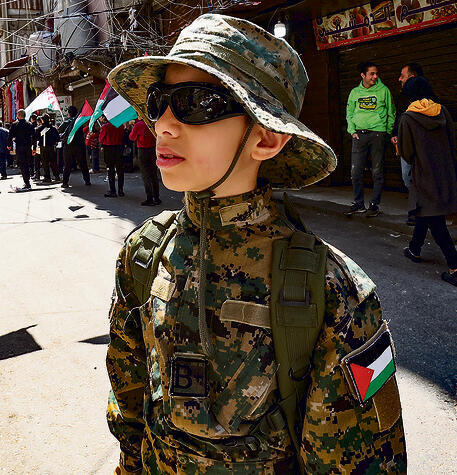

A boy in military fatigue and a patch of the Palestinian flag, south Beirut
(Photo: ANWAR AMRO, AFP)
What do you think of Hezbollah?
“I hate Hezbollah for taking over the parliament and running life in Lebanon according to their whims. What’s left for us citizens is to keep our distance from them—not to give them any foothold voluntarily. It bothers me a lot that lists of people entering Lebanon through the airport or seaports are first sent for Hezbollah’s approval. It bothers me that they take food products from stores without paying. It bothers me that in the southern suburbs of Beirut, Hezbollah’s stronghold, civilians are forced to live according to Nasrallah and his cronies’ dictates.”
And about Israel?
“I have great admiration and envy for your advanced technology. But I see that your tech companies are closing or moving abroad. I also follow, through social media, the conversations of Israelis criticizing other Israelis. Honestly, it reminds me of what’s happening here, but it’s stronger over there—just without the injuries and deaths.
“There are huge gaps between classes here in Lebanon, and I know there are also wealthy billionaires and millionaires in Israel. I understand Prime Minister Netanyahu is one of them. I’d like to see connections between the middle classes of both countries. When? I don’t know. Is it possible? Certainly. We just need to get rid of all the wicked, hypocritical and greedy leaders.”



